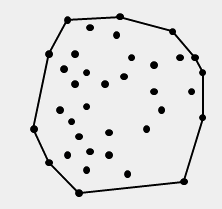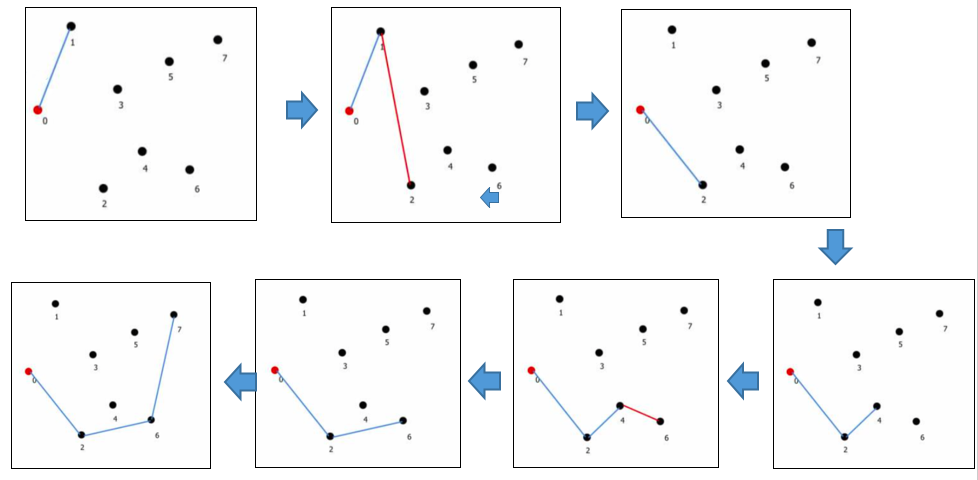版本 b1fadc4d76206a79e2ed04e7009fea49726cac8b
Changes from beginning to b1fadc4d76206a79e2ed04e7009fea49726cac8b
定義
=============
在散所有散佈點中,找出一個凸多邊形可以剛好包含所有的點<br>
像下圖所示
<br>
演算法介紹
=============
有三種方法來找出凸多邊形
Brute Force
-------------
說明:<br>
此方法為暴力解,先選擇任意兩個點構成線 <br>
假設其他的點都在那條線的左邊(or右邊, 固定一邊)<br>
則此邊為我們要的邊<br>
<br><br><br>
pseudo code: <br>
```c++
Algorithm CH(P)
E←∅(* edge-list of CH(P) *)
for all ordered pairs (p,q) ∈ p×p, p≠q do
supporting ← true
for all points r ∈ P-{p,q} do
if r is on the right side of pq then supporting ← false
if supporting then add directed edge pq to E
From the (un-ordered) edge-list E, construct the list of vertices of CH(P) in CCW order in O(n) time. (How?)
end
```
<br>
複雜度:O(n³)
Graham-Scan
-------------
說明:<br>
1.選定起始點,利用起始點跟其他點連線所構成的角度,去sort各個點
2.再開始一個一個點連線,假設
Andrew's Monotone Chain
----------------------------
>step1:將所有點按座標大小排序
<br>
>step2:將下半部圍起來
<br>
>step3:維持下半部不動,將上半部圍起來
<br>
>step4:刪去重複的起點
------------------------------
STEP1: 依照每個點的x座標進行排序
<br>
STEP2:
```c++
int m=0;
for(int i=0; i<N; i++)
{
while(m>=2 &&
cross(CH[m-2], CH[m-1], P[i] <= 0) m--;
CH[m++] = P[i];
}
```
<br>
STEP3:
```c++
for(int i=N-2, t=m+1; i>=0; --i)
{
while(m>=t &&
cross(CH[m-2], CH[m-1], P[i] <= 0) m--;
CH[m++] = P[i];
}
```
<br>
STEP4:刪除最後一個點
<br> 
